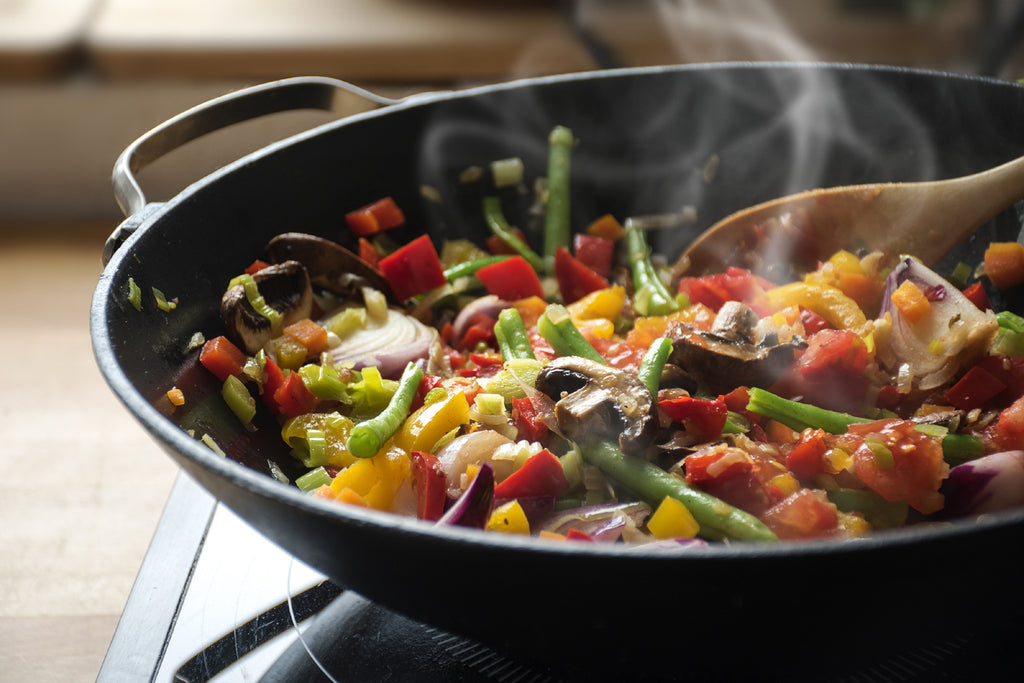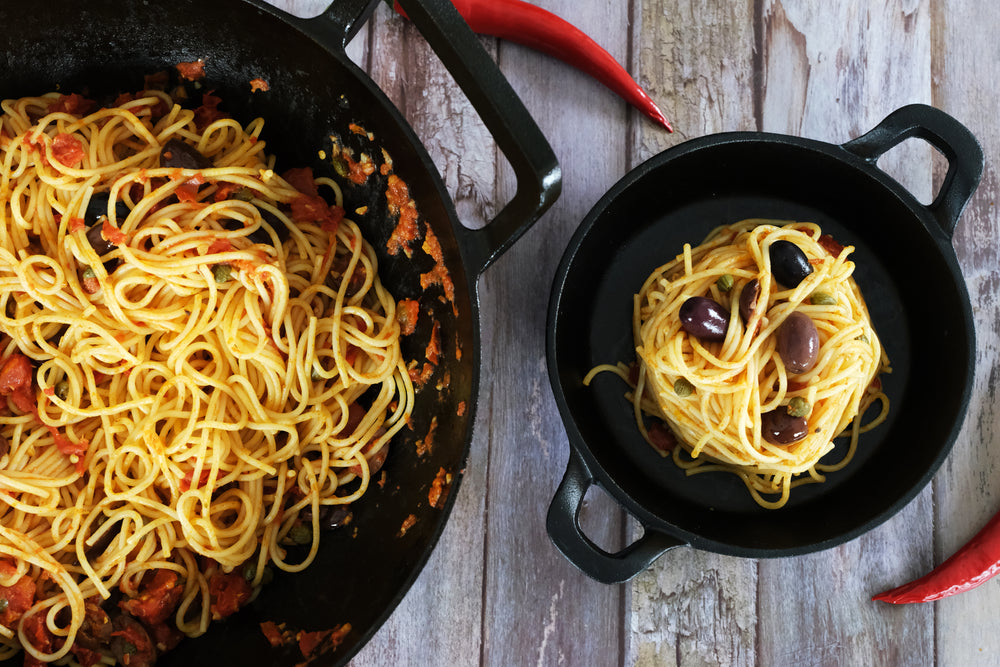Pourquoi un wok en fonte est une meilleure alternative : avantages et inconvénients comparés à d'autres matériaux

Les woks sont un élément de base de la cuisine asiatique depuis des siècles, et pour une bonne raison. Ce sont des outils polyvalents et efficaces qui peuvent gérer une large gamme de tâches culinaires, du sautage et culottage à la cuisson à la vapeur et à la friture profonde. Lorsqu'il s'agit de choisir un wok, de nombreuses options sont disponibles, mais un matériau qui se démarque est la fonte.
Les woks en fonte sont de plus en plus populaires en raison de leur durabilité, polyvalence et excellente rétention de la chaleur. Dans cet article de blog, nous explorerons pourquoi un wok en fonte est une meilleure alternative que d'autres matériaux, y compris les avantages et inconvénients comparés à d'autres matériaux.

Qu'est-ce qu'un wok en fonte ?
Un wok en fonte est une poêle profonde et ronde faite de fonte, un type d'alliage de fer connu pour sa durabilité et sa rétention de la chaleur. Les woks en fonte ont un fond plat et des côtés inclinés qui facilitent le mélange et le retournement des ingrédients. Ils sont généralement culottés avec de l'huile ou de la graisse pour créer une surface antiadhésive et prévenir la rouille.
Avantages d'un wok en fonte
-
Rétention de la chaleur : L'un des plus grands avantages d'un wok en fonte est sa capacité à retenir la chaleur. La fonte est un matériau dense qui peut conserver la chaleur longtemps, même après que la source de chaleur a été retirée. Cela signifie que vous pouvez cuire les aliments de manière uniforme et rapide sans vous soucier des points chauds.
-
Polyvalence : Les woks en fonte sont polyvalents et peuvent être utilisés pour diverses méthodes de cuisson, y compris le sautage, le culottage, le braisage et même la friture profonde. Ils peuvent également être utilisés sur différentes sources de chaleur, y compris les plaques à gaz, électriques et à induction, ainsi que sur les grils et dans les fours.
-
Durabilité : Les woks en fonte sont incroyablement durables et peuvent durer des générations avec un entretien approprié. Ils résistent aux rayures et aux bosses et peuvent supporter des températures élevées sans se déformer.
-
Surface antiadhésive : Lorsqu'il est correctement culotté, un wok en fonte peut avoir une surface naturellement antiadhésive qui facilite la cuisson et le nettoyage. Cela peut être une excellente alternative aux revêtements antiadhésifs qui peuvent s'écailler ou se rayer avec le temps.
-
Aliments enrichis en fer : Cuisiner dans un wok en fonte peut ajouter une petite quantité de fer alimentaire à vos plats. Cela peut être particulièrement bénéfique pour les personnes souffrant de carences en fer.

Inconvénients d'un wok en fonte
-
Lourd : Les woks en fonte peuvent être lourds, surtout comparés à d'autres matériaux comme l'acier au carbone ou l'aluminium. Cela peut les rendre plus difficiles à manipuler et à manier, surtout lorsqu'ils sont remplis de nourriture.
-
Long à chauffer : Les woks en fonte peuvent prendre plus de temps à chauffer que d'autres matériaux, ce qui peut être frustrant si vous êtes pressé. Cependant, une fois chauffés, ils conservent cette chaleur longtemps.
-
Nécessite du culottage : Les woks en fonte doivent être culottés régulièrement pour maintenir leur surface antiadhésive et prévenir la rouille. Cela peut être une étape supplémentaire que certains cuisiniers peuvent trouver contraignante.
Matériaux alternatifs pour wok
Bien que la fonte soit un choix populaire pour les woks, il existe d'autres matériaux à considérer. Voici quelques alternatives courantes avec leurs avantages et inconvénients :
-
Woks en acier au carbone : Les woks en acier au carbone sont plus légers et plus faciles à manipuler que les woks en fonte. Ils chauffent également plus rapidement, ce qui en fait un excellent choix pour les cuisiniers qui veulent préparer le dîner rapidement. Cependant, ils ne retiennent pas la chaleur aussi bien que les woks en fonte et peuvent nécessiter un culottage plus fréquent.
-
Woks antiadhésifs : Les woks antiadhésifs sont pratiques et faciles à nettoyer, mais ils peuvent se rayer et s'écailler avec le temps. Ils ne peuvent pas non plus être utilisés à haute température, ce qui limite leur polyvalence en cuisine.
-
Woks en aluminium : Les woks en aluminium sont légers et abordables, mais ils peuvent se déformer et ne peuvent pas être utilisés avec certaines sources de chaleur, comme les plaques à induction.

Un wok en fonte est un ustensile de cuisine polyvalent et durable qui offre des avantages tels que la rétention de la chaleur, la polyvalence, la durabilité, une surface antiadhésive et des aliments enrichis en fer. Cependant, les woks en fonte peuvent être lourds, longs à chauffer et nécessitent du culottage. Les woks en acier au carbone sont une alternative plus légère et plus facile à manipuler, tandis que les woks antiadhésifs sont pratiques mais ne peuvent pas être utilisés à haute température. Les woks en aluminium sont légers et abordables mais peuvent se déformer et ne peuvent pas être utilisés avec certaines sources de chaleur. En fin de compte, le choix du matériau du wok dépend des préférences personnelles et des besoins culinaires.
Contenu connexe : Quand cuisiner avec un wok
















I have 2 cast iron woks of different sizes, such as 13 and 14, and they are light weight that are made in China. I love using them very much for my Asian stir frying foods. I bought them from the Wok Shop of San Francisco, CA. They are wonderful.
Laisser un commentaire